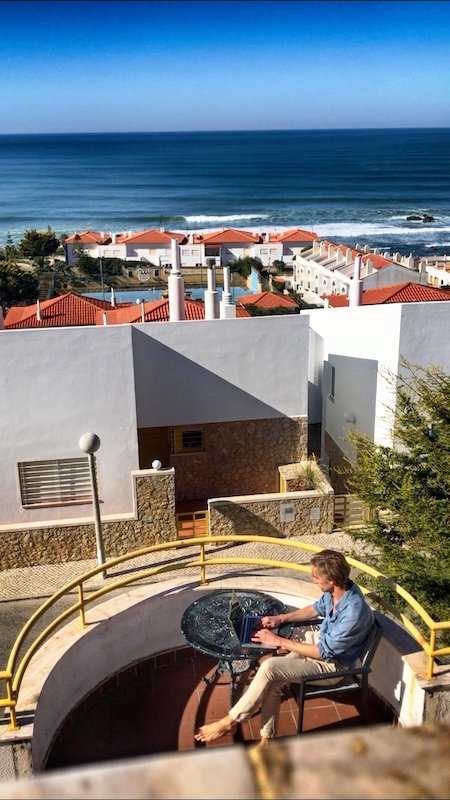
Stories of a traveling writer
In september 2020 I quit my job to finish a novel. And if I am to spend my days at my laptop, I might as well do it elsewhere than home.
In France, for example.
Over the internet I get in touch with Charlotte, who lives the Bourgogne region with her dog Buster, but works in Paris.
She leaves home at 7:30 AM and returns 37 hours later, and all that time the spoiled Buster is home alone.
If I come and care for her dog, I can live with her to work on my book, she says.
A great deal, I would stay there for six weeks.
Or in Ireland, in a Carmelite monastery at the foot of a mountain, where I live as a recluse during weekdays, planing my manuscript as though it were a board of wood, and warm myself by the library hearth on the weekend, with the other hermits around me and a glass of Guinness in my hand.
During this nomadic adventure, which still continues, I write stories. About Parisians who flee from a smothering lockdown, about the eggs of a kind murderer, about the monk who sees more danger in his profession than in that of his grandfather, the spy who carried out nightly operations behind enemy lines. About the environments you get to know better than as a tourist from a hotel, about vindicated childhood fears during dangerous swimming trips, about weathered harbor cats on Portugal, and about my attempts to write and publish.
Read an excerpt of a story below, or listen to the audio version.
⬇︎

An excerpt from a Portuguese travel story
A friend I made in the monastery, a non-religious passerby like myself, owns a coastal house in Portugal. ‘It’s a beautiful place for a writer’, he says, ‘I think you must go there.’
If I must.
And so I am now in a charming coastal town, I see the ocean’s fits of anger when I look through the living room window, every second day I swim in her, I spend the nights with opened window and lowered shutters, which I don’t lower completely, so that countless tiny holes exist between myself and the night. Through those holes I hear the rushing of the ocean in the dark room, never quite stopping, and when I’m lucky I even smell her salty scent, but I always feel her freshness on my skin and awake much more lively with the window open than when I close it, even though it’s also colder.
And when I get up at night to drink a glass of water, and stare out for a minute, the waves reflect the moonlight, which reflects the sunlight, an agreeable promise of the coming day, and when she arrives, her rays pierce the shutters and gently wake me, and I roll out of bed and write a few hours.
When I swim, in the afternoon, I do so in a minuscule bay that is separated from the ocean by a pier, over which the water tumbles, but never with the strength to pull you to where the sea bed is deep and no one can see you anymore.
The ocean water is about fourteen degrees Celcius, and so cold that your skin hurts afterwards, but your gaze is clear and calm when you sit at the beach in the sun.
It’s a funny beach, because the dry port of the fishing boats is right behind it, dry because the boats just lie waiting on the concrete until a tractor drags them to the ocean.
A bit farther five, six cats live between the fishing gear, cats that spend their days sleeping in the ocean wind. The salty moistness sometimes hangs in their furs. If you look well, you see minuscule droplets at the tips of their hairs. One cat has a patch of skin cancer at its nose, the other has torn ears, their eyelids won’t open fully, so they are weathered cats, but when I greet them, with soft voice, they open their eyes and look at me sleepily, sometimes they stretch their backs and smell my hands.
My usual walk passes by them, and once I met a Portuguese lady, eighty years old, who walks two kilometers a day to feed them. She gave them names, one was called Ulysses, as in Odysseus, there was a story behind it, but I forgot it. It’s not clever for a writer to forget stories.
On the way home from the port, I sometimes run into a different cat. Sometimes I don’t see him when I pass and he moans indignantly. I must then go to him and stroke him, until he’s had enough, then he just walks away.
Once I encountered him when he sat on the slanted roof of the bakery. He miaowed loudly, and so I thought that he had perhaps gotten stuck up there, so I bent over and turned my back into a landing strip, but he didn’t jump and moaned some more. So I walked on, and he managed to get off on his own.
Cats are stubborn animals, my favourite. Or perhaps stubborn is what we call those who have a plan that differs from our own, and it’s really us who are little tyrants, when something doesn’t go the way we had thought it up. And I call such a sweet cat stubborn.
Sorry, cat, you can call me Bonaparte.





